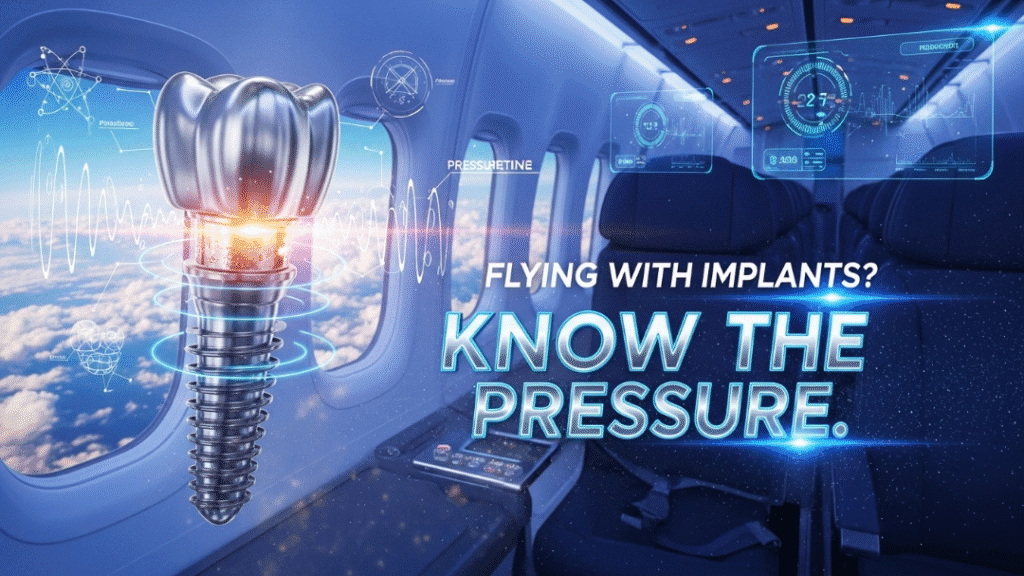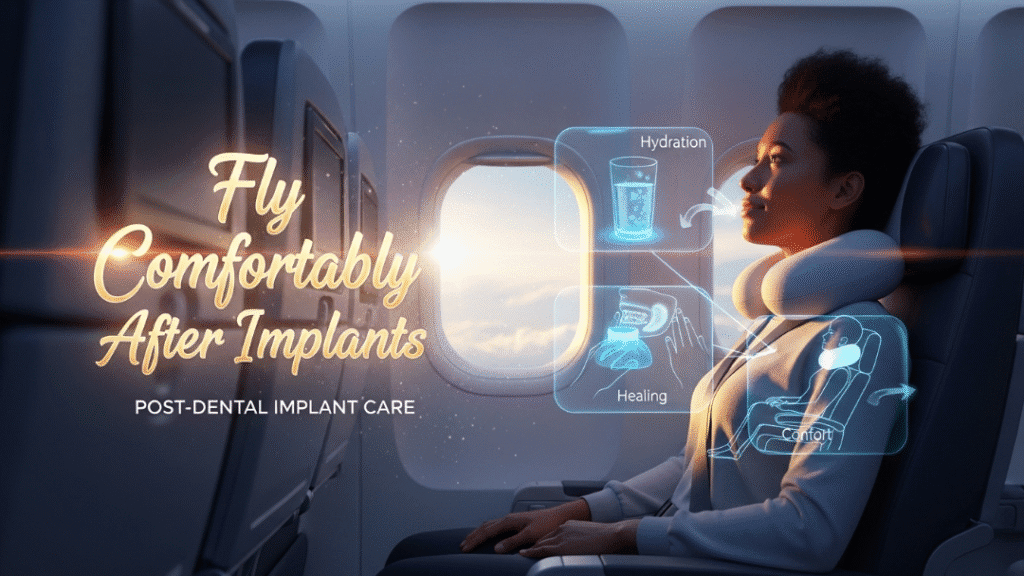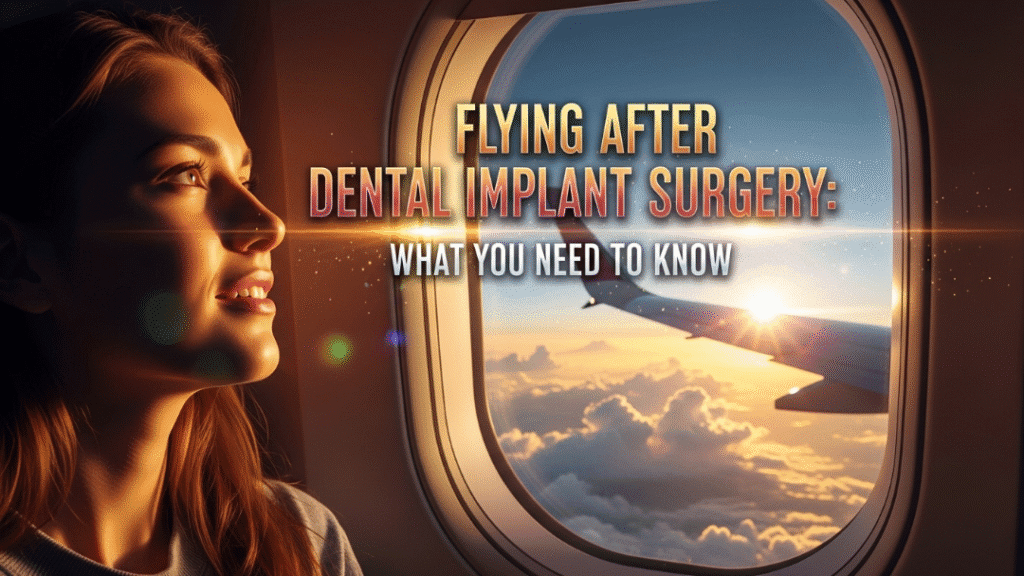Getting dental implants is a significant step toward restoring your smile and confidence. But what happens when you have travel plans that involve flying after your procedure? Whether you’re returning home from dental tourism or have a business trip scheduled after your implant surgery, understanding the potential risks and necessary precautions is essential for a smooth recovery.
At Dental Implants Dallas TX, we understand that life doesn’t pause for dental procedures. That’s why we’ve created this comprehensive guide to help you navigate air travel safely after dental implant surgery.
Key Takeaways
- ✈️ Wait at least 48-72 hours after dental implant surgery before flying to reduce risks of complications
- 🦷 Cabin pressure changes can potentially impact healing and increase discomfort
- 💊 Pack essential medications, pain relievers, and dental care supplies in your carry-on luggage
- 🩺 Consult with your implant dentist before flying and get emergency contact information
- 🚑 Consider purchasing travel insurance that covers dental emergencies if flying internationally
Understanding the Risks of Flying After Dental Implant Surgery
Dental implant surgery is a multi-step procedure that involves placing titanium posts into your jawbone to serve as artificial tooth roots. The healing process is critical to the success of your implants, and certain factors—including air travel—can potentially affect this process.
How Cabin Pressure Affects Healing
When you fly, the cabin pressure changes significantly. At cruising altitude, airplane cabins are pressurized to simulate an altitude of about 6,000-8,000 feet. This pressure change can affect your body in several ways:
- Sinus Pressure: The air in your sinuses expands during ascent and contracts during descent, which can put pressure on healing tissues near your implant sites
- Blood Flow: Reduced cabin pressure can slightly decrease oxygen levels in your blood, potentially slowing the healing process
- Discomfort: Pressure changes can increase pain or discomfort around the surgical site
Potential Complications
Flying too soon after dental implant surgery may increase the risk of certain complications:
- Bleeding: Pressure changes can potentially disrupt blood clots at the surgical site
- Swelling: Extended sitting during flights can contribute to increased swelling
- Infection: Exposure to recycled air and close proximity to others may increase infection risks
- Pain: Discomfort may be amplified during pressure changes, especially during takeoff and landing

Recommended Waiting Period Before Flying
The ideal waiting period before flying depends on the extent of your dental implant procedure and your individual healing progress. However, there are some general guidelines to consider:
Minimum Waiting Times
| Type of Procedure | Recommended Minimum Waiting Time |
|---|---|
| Single implant with minimal surgery | 48-72 hours |
| Multiple implants | 3-5 days |
| Implants with bone grafting | 7-14 days |
| Full-mouth reconstruction | 14+ days |
These timeframes are general recommendations. Your implant dentist at Dental Implants Dallas TX will provide personalized advice based on your specific situation.
Factors That May Extend the Waiting Period
Several factors might require you to wait longer before flying:
- Complications during surgery: If your procedure was more complex than anticipated
- Slow healing: If you’re experiencing delayed healing for any reason
- Bone grafting: Additional procedures like bone grafts require extra healing time
- Medical conditions: Diabetes, immune disorders, or other conditions that affect healing
- Age: Older patients may require additional recovery time
“The success of dental implants depends significantly on proper healing during the initial post-operative period. Flying too soon can potentially compromise this critical phase.” – Dr. Sarah Johnson, Implant Specialist
Pre-Flight Preparation
If you must fly after dental implant surgery, proper preparation can help minimize risks and ensure a more comfortable journey.
Consultation with Your Dentist
Before booking your flight, schedule a follow-up appointment with your implant dentist. They can:
- Assess your healing progress
- Provide clearance for travel
- Offer specific recommendations for your situation
- Prescribe any necessary medications for the journey
Make sure to inform your dentist about your travel plans well in advance so they can incorporate this into your treatment plan. If you’re experiencing any dental implant throbbing pain before your flight, be sure to have this addressed.
Essential Items to Pack
Create a dental travel kit to keep in your carry-on luggage:
- Prescribed medications (pain relievers, antibiotics)
- Extra gauze pads for unexpected bleeding
- Salt packets for making salt water rinses for dental implants
- Soft-bristled travel toothbrush
- Alcohol-free mouthwash in travel-sized container
- Cold pack (ask flight attendants for ice in a bag if needed)
- Written care instructions from your dentist
- Emergency contact information for your dentist
Documentation to Carry
Bring these important documents with you:
- Dental records related to your implant procedure
- Letter from your dentist clearing you for travel (helpful for international flights)
- Prescription information for any medications you’re carrying
- Insurance information, including any dental coverage for emergencies
During the Flight: Tips for Comfort and Safety
Once you’re on the plane, these strategies can help minimize discomfort and protect your healing implants.
Managing Pain and Pressure
- Take prescribed pain medication about an hour before your flight (with your dentist’s approval)
- Stay hydrated by drinking plenty of water (avoid alcohol and caffeine)
- Use the Valsalva maneuver during takeoff and landing: pinch your nose closed, close your mouth, and gently try to exhale to equalize pressure
- Apply cold compress if you experience swelling (request ice from flight attendants)
Oral Hygiene During Travel
Maintaining oral hygiene while traveling is crucial for preventing dental implant rejection:
- Rinse gently with water after eating
- Avoid hard, crunchy, or sticky foods during your flight
- Use alcohol-free mouthwash for quick refreshing (but don’t rinse vigorously)
- Avoid touching the surgical area with your tongue or fingers
Dietary Considerations
What you eat and drink during your flight matters:
- Choose soft foods like yogurt, mashed potatoes, or pasta
- Avoid extremely hot or cold foods that could cause sensitivity
- Skip carbonated beverages as they can irritate the surgical site
- Stay hydrated with still water throughout the flight
- Avoid alcohol as it can interact with medications and increase bleeding risk

Special Considerations for Long-Haul Flights
International or long-distance flights present additional challenges after dental implant surgery.
Extended Flight Duration Precautions
For flights longer than 4 hours:
- Move around the cabin every hour to improve circulation
- Consider compression socks to prevent swelling in your legs
- Request an aisle seat for easier access to the bathroom
- Set reminders to take medications at appropriate intervals
- Bring extra supplies in case of delays or extended travel time
Dealing with Jet Lag and Recovery
Jet lag can impact your body’s healing process:
- Adjust to the new time zone gradually if possible
- Maintain your medication schedule based on hours elapsed, not time zones
- Get adequate rest after arriving at your destination
- Continue proper hydration even after landing
- Schedule extra recovery time at your destination before engaging in activities
Post-Flight Care
Your care routine shouldn’t end when your flight does. Proper post-flight care is essential for continued healing.
Monitoring for Complications
After landing, be vigilant for these warning signs:
- Increased pain or swelling that doesn’t subside
- Bleeding that resumes or increases
- Fever or signs of infection
- Implant mobility or changes in how your bite feels
- Unusual taste or odor from the surgical site
If you experience any of these symptoms, contact a dental professional immediately. For long-term care, knowing how to properly maintain your dental implant crown is essential.
Finding Emergency Dental Care While Traveling
Before your trip, research dental care options at your destination:
- Save contact information for emergency dental services
- Check if your dental insurance offers coverage at your destination
- Consider purchasing travel insurance with dental coverage
- Know the location of the nearest hospital with dental services
- Have your dentist’s contact information available for consultation
Special Scenarios
Some situations require additional planning and precautions.
Flying for Dental Tourism
If you’re traveling specifically for dental implant surgery:
- Plan to stay at your destination for the recommended healing period
- Research post-operative care options at your destination
- Verify the credentials of your dental provider
- Understand the follow-up process and how it will be handled remotely
- Consider potential complications of traveling home with new implants
Emergency Travel After Implant Surgery
If you must fly unexpectedly soon after implant surgery:
- Get explicit clearance from your dentist
- Consider upgrading to business or first class for more space and comfort
- Inform the airline of your recent surgery (they may offer accommodations)
- Travel with a companion if possible
- Create a detailed plan for managing complications during travel
Common Mistakes to Avoid
When flying after dental implant surgery, be careful to avoid these dental implant recovery mistakes:
- ❌ Rushing your return flight without adequate healing time
- ❌ Forgetting to pack essential medications in your carry-on
- ❌ Consuming alcohol or caffeine during your flight
- ❌ Neglecting oral hygiene while traveling
- ❌ Ignoring warning signs of complications
- ❌ Failing to stay hydrated throughout your journey
- ❌ Not consulting with your dentist before traveling
Long-Term Considerations
Even after the immediate post-operative period, there are some considerations for air travel with dental implants.
Future Air Travel with Dental Implants
Once fully healed, dental implants shouldn’t cause any issues during air travel. However:
- Be aware that some patients report mild discomfort or pressure sensation around implant sites during significant altitude changes
- Continue good oral hygiene practices while traveling
- If you experience any unusual symptoms during future flights, consult with your dentist
- Carry information about your implants when traveling internationally
Ongoing Maintenance While Traveling
Maintaining your implants while away from home:
- Pack appropriate cleaning tools like a water flosser for dental implants
- Stick to your regular cleaning routine even while traveling
- Be cautious with unfamiliar foods that might damage implants
- Know how to recognize signs of potential issues like peri-implantitis
When to Contact a Dental Professional
While most patients can fly safely after the recommended waiting period, you should contact a dental professional immediately if you experience:
- Severe pain that isn’t controlled by prescribed medications
- Excessive or renewed bleeding
- Signs of infection (fever, increased swelling, pus)
- Implant mobility or displacement
- Difficulty breathing or swallowing
These symptoms could indicate serious complications that require prompt attention, especially if they occur during or after air travel.
Conclusion
Flying after dental implant surgery requires careful planning and precautions to ensure your healing progresses smoothly. By following the recommended waiting periods, preparing adequately for your journey, and taking proper care during and after your flight, you can minimize risks and protect your investment in your new smile.
Remember that every patient’s situation is unique, and the specific guidance from your dental implant specialist should take precedence over general recommendations. At Dental Implants Dallas TX, we’re committed to supporting your complete recovery journey, even when it includes travel plans.
If you’re planning to travel after dental implant surgery or have concerns about an upcoming flight, don’t hesitate to contact our office for personalized advice. Your successful healing and comfort are our top priorities.
Flight Readiness Checker
Dental Implant Flight Readiness Checker
Answer a few questions to assess if you’re ready to fly after your dental implant surgery


Leave a Reply
Share your thoughts or ask a question about dental implants. Your email address will not be published.